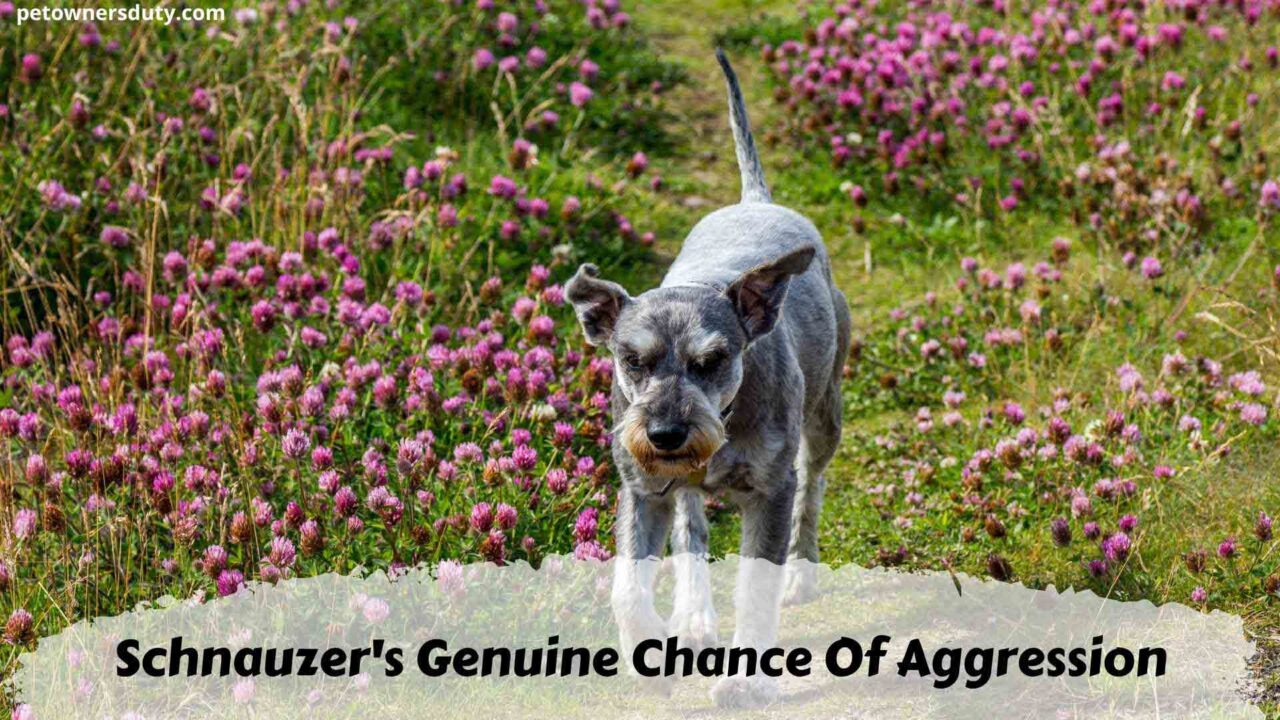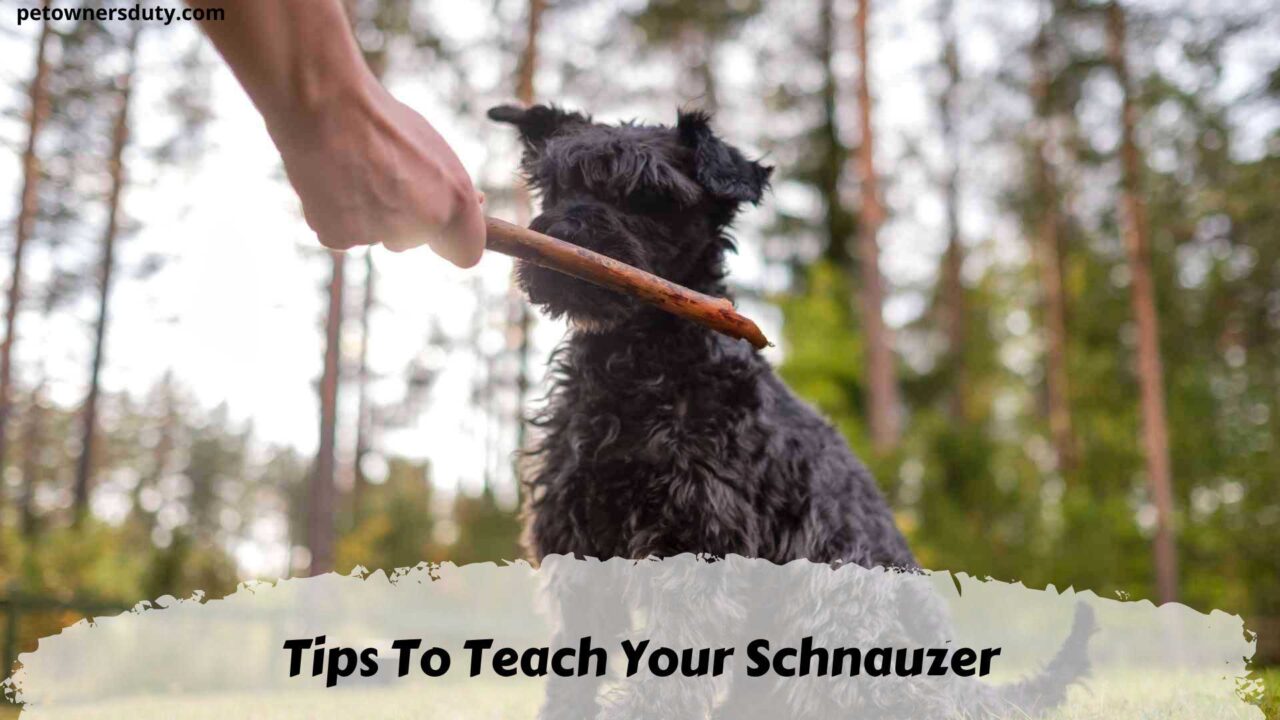Top 9 Reasons : Why Schnauzers Are The Worst Dogs?

These dogs are among the most famous breeds in the world, frequently ranking among the best 20 from the American Kennel Club.
There are many various variants. The smallest of the group is the Miniature Schnauzer, weighing around 4.5 kg or so. Meanwhile, the Giant Schnauzer marks the scales at above 45 kgs!
A Standard Schnauzer is the most renowned of all. It is much more manageable, weighing around 35 to 40 pounds.
They are extremely active, showing high stamina levels and frequently experiencing power bursts you can seem to manage. They make excellent household dogs and are fairly effortless to train.
So why do a few people think Schnauzers are the worst dogs of all?
Reasons Why Schnauzers are Just the Worst
Possessing a Schnauzer can be a true challenge. It does not matter whether you’ve a big dog or a small one. This breed has a few intrinsic characteristics that may make you think-again adopting one.
Here are a few of the most typical reasons some dog fanatics don’t like Schnauzers.
1. They Require Lots of Exercise

If you acquire a Schnauzer, be ready to deal with their plenty of exercise demands.
These dogs were originally bred to be farm pups. They had to have excessive energy levels to manage their multiple jobs. Not only were they born to guard cattle and herd livestock, but they also had to manage rodents.
Those job needs were quite steep, so these dogs created pretty-high stamina levels to manage it all. While most dogs these days are nothing more than hairy fellows, that energy stays.
Schnauzers require everyday walks and an abundance of play options. Otherwise, they’ll divert to devastation.
These pups are notorious for ruining furniture and causing havoc when they’ve too much-repressed energy.
2. Barking Can Become a Main Problem
It is a harsh fact you will need to face as a Schnauzer keeper: These puppies like to bark… a ton!
They are a verbal breed that takes every possibility they can to express their truth! Whether they are starving, need to play, or desire to go outside, they will let you know.
The barking can become persistent, and overlooking it does nothing but cause your pup to bark more.
If you are searching for a lovely dog that’s relaxed, calm, and peaceful, Schnauzers are not for you. They can create real concern in condos or apartments, so ensure to consider their barking practices before adopting.
3. Grooming Can Be a headache
If being comfortable with the groom is a foremost priority for you when searching for a canine, move on! This breed has some quite demanding fur. While it does not shed as much as other canines, it still needs significant care.
The outer coat of hair is lengthy and contains a stringy texture. It develops quite quickly, resulting in the requirement for common cuts. But that’s not all. The dogs are notorious for creating painful tangles and mats.
Most dog owners will go to experienced groomers every 4 to 6 weeks to avoid all that. That can get quite costly. Even if you’re planning on grooming your puppy yourself, you will spend a ton of time dealing with your dog’s hair.
4. There’s a Genuine Chance of Aggression

Now, these dogs are not quite aggressive and are not anywhere near as violent as a few other dogs out there. However, Schnauzers are completely capable of being fierce toward you, your family members, and other puppies.
The problem arrives back to all that pent-up energy they carry. The dog needs to direct that energy somewhere. While most will shift to ruin your furniture, some will get on aggression mode.
Schnauzers are not the most suitable to have in multi-pet houses. They can turn on a growling, dime, and show their teeth out of nowhere. If the culprit doesn’t get off, they can turn to bites.
5. Schnauzers like to Chase Small Animals
As if the case of aggression was not enough, these pups enjoy chasing smaller animals.
Remember: They’re initially bred to capture rodents on the farm. That powerful prey drive still exists in current puppies.
You may not witness any damage or foul in allowing your dog to chase squirrels in the yard, but it can lead to multiple troubles.
Most dogs of this breed will instantly give chase without thinking twice. Secondly, what happens if your canine catches a stray rodent outside? Once again, the prey endeavors boots in, and the dog won’t stop until they achieve it.
6. They’re Strong-Willed and Stubborn
If you do not have any experience training a pup, be prepared for a severe battle with Schnauzers. Those who’ve owned puppies before shouldn’t have any issues. But these pups will step all over the keeper who lacks confidence.
They are strong-willed and like to be free. While not as bad as Malamutes and Huskies, Schnauzers will definitely test you. If you move back, it can be a challenge to maintain your dominance. It needs plenty of work to train these dogs.
Experienced keepers can get there fast as these dogs are smart enough to pick up orders. But amateur dog owners may encounter them too much to handle.
The dog doesn’t get along with other larger pets. The Miniature Schnauzer, unlike multiple other terriers, falls in greatly with other dogs.
7. Schnauzers Are Energetic and like to play games.
These are quite energetic pooches that enjoy playing. They thrive on mental and physical stimulation and require lots of playtime and exercise. They also like playing games like hide-and-seek, fetch, and tug-of-war.
If you do not have the energy or time to maintain up with a dog’s activity needs, then this might not be the correct choice for you.
8. Not Good for First-Time Dog Owners
These are smart and active dogs that require a skilled owner who can train them correctly. If you are a novice dog owner, then this class may not be the most suitable fit for you, as they need more time and watch than other breeds.
If you are searching for a family pet, then a more docile breed, such as a Labrador Retriever or a Golden Retriever, may be a good option.
9. Prone to Health Issues

They are usually a healthy breed, but they’re still inclined to particular health concerns. These include cataracts, hip dysplasia, diabetes, and heart disease.
While there are tests available to inspect for these problems, it’s essential to be mindful that some of these concerns can be expensive to treat. If you are seeking a generally healthy dog, then a Schnauzer may not be the finest option for you.
10 Tips on How to Teach Your Schnauzer

1. Begin with positive reinforcement. Use praise and treats when your pet is behaving right.
2. Utilize verbal commands like “stay” and “sit” to help your Schnauzer know essential commands.
3. Socialize your dog as early as possible so it can get used to other animals and people.
4. Set a routine for strolls and mealtime so your dog knows what to expect every day.
5. Don’t scold or punish your pet for bad behavior, as that’ll only make issues worse.
6. Practice the same commands many times every day so that they become 2nd nature to your pup.
7. Exercise your pup daily, as this can help ease any violent behaviors because of anxiety or boredom.
8. Be consistent with boundaries and rules, as that’ll help your pet know what is good behavior and what isn’t permitted in your home.
9. Reward pleasing behavior with toys or treats, as that’ll motivate him to persist the good behavior in the future.
10. If possible, enroll in keeping classes with a skilled trainer who can guide how to skillfully train your dog.
Frequently Asked Questions
How much do Schnauzers cost?
On average, you can expect to spend between $700 to $1500 for a new pup, as well as around $350 to $800 yearly expenses, relying on the breed.
Expect to spend about $500 to adopt a completely grown pup from an animal shelter. If you buy a pet from a breeder, you could pay anywhere between $600 and $2000.
How large are Schnauzers?
The most typical sizes are 19 to 22 inches for females and 20 to 23 inches at the shoulder for males. The taller puppies will weigh about 40 to 60 pounds for both female and male dogs.
How much do Schnauzers shed?
They make plenty of hair, but that’s normal. They also shed fairly high when they’re groomed. If you like them less furry, routine brushing and combing may be needed.
What is the life expectancy of a Schnauzer?
The average Schnauzer’s life expectancy is about 10 to 13 years. However, this relies on their health as well as the way they’re maintained.
To Sum Up
The cons of possessing one, though, overshadow the pros. And, unlike other pups on the list, they don’t make the most suitable dog for household life. Don’t forget to do your research and discover if a respected breeder has available pups that fit your criteria before completing your buy.






